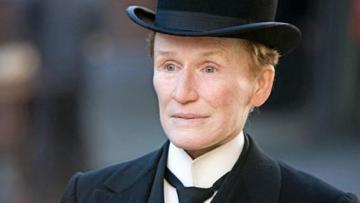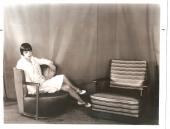Glenn Close is superb in gender-bending 'Albert Nobbs'
Glenn or Glenda?
The answer in 19th-century Ireland echoes that of 21st-century America: It's about jobs, stupid!
Albert Nobbs has a painfully constricting one as butler-waiter-valet in a Dublin hotel, whose pretentious proprietress is always on the lookout and ready to dismiss her staffers for any real or imagined infraction. But she has no need to worry about Albert. He is ultra-meticulous, by inclination and necessity.
The inclination is seen in his faultless conduct and careful notation of all tips before hiding them under the floorboards of his room. The necessity stems from the fact that he is really a she (Glenn Close) -- passing herself off as a man in order to be able to work and survive.
It's been some 30 years since she first donned men's clothes and enslaved herself to the gender dictates of a private prison. She knows no other self now and must do whatever it takes to keep her secret. But the nagging, ongoing fear of discovery is suddenly heightened by having to share her tiny room with a local painter named Hubert (Janet McTeer).
Director Rodrigo Garcia ("In Treatment") combines grit with grace in a narrative technique that relies as much on glances, signals and reactions as on dialogue. Indeed, it's the "play of the eyes" that's at the heart of the screenplay (co-written by Ms. Close herself and John Banville), based on a short story by George Moore.
The result is exquisite, if fairly lugubrious, as Albert comes to believe that what he really needs is a wife. His efforts to court and secure one in the form of chambermaid Helen (Mia Wasikowska) are thwarted by Helen's far greater interest in sexily scarred Joe (Aaron Johnson), the new and somewhat sinister boilerman.
Ms. Close's performance is extraordinary in every way. With her close-cropped ginger hair and translucent complexion, she wears a blank, slightly quizzical mask of an expression that is eerily like that of the robot C-3PO in "Star Wars." So long accustomed to mind-numbing deference, even to the snotty children of the rich, her Albert has become purely robotic in fact and deed.
Albert appears to see and hear nothing, while seeing and hearing everything. But he is pure and kind, at heart, and the lengths to which he goes for Helen are heartbreaking. So is his modest dream of a tobacconist's shop and cozy fireplace -- so sweetly, hopelessly unattainable.
McTeer as the empowered and powerful Hubert nearly steals the show, serving as Albert's eventual inspiration and delightful counterpoint to his tight-lipped repression. For that matter, all the performances in "Albert Nobbs" are excellent. Ms. Wasikowska and Mr. Johnson are both physically and emotionally appealing. Brendan Gleeson as a down-to-earth doctor adds a touch of humanity to Pauline Collins' wonderfully nasty hotel owner. All the minor staff characters are likewise nicely and uniquely drawn -- the drunk one, the motherly one, the slutty one -- as well as the dissipated aristocratic guests.
Gender-bending "Albert" is a labor of love for Ms. Close, who has been trying to get it onto the big screen for decades, since playing the stage role in 1982. On the surface Albert is a bland, fragile, uninteresting milquetoast, but underneath lie turbulent depths of emotion, confusion and love. He is clownish and tragic at once -- truly a kind of career-crowning role for Ms. Close, who deserves the Oscar nomination she received for it. (So does Ms. McTeer.)
They won't win.
And neither will the exit song, which was not nominated, but it's a beautiful one called "Lay Your Head Down" with lyrics by Ms. Close, lushly orchestrated by Brian Byrne, sung by Sinead O'Connor.
In the end, someone says, "We are all disguised as ourselves."






